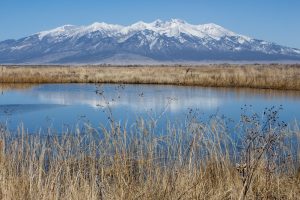Comment Period for Proposed Rule Affecting National Wildlife Refuges Ends June 8
The US Fish and Wildlife Service and Department of the Interior are proposing to expand hunting and fishing by 2.3 million acres on 97 of our National Wildlife Refuges. The Proposed “2020-2021 Annual Hunting and Sport Fishing Regulation” was published in the Federal Register on April 9, and the public comment period that will end on Monday, June 8 at midnight Eastern Time.
Why Coloradans Should Care
The federal rule affects the following three national wildlife refuges in Colorado:
Monte Vista National Wildlife Refuge

Alamosa National Wildlife Refuge

Brown’s Park National Wildlife Refuge

The rule has the potential to limit “non-consumptive” activities such as birding. This is especially important in Alamosa and Monte Vista National Wildlife Refuges because both are considered Important Bird Areas.
These Important Bird Areas have been identified as sites important to nesting, migratory, and wintering species of birds. Some sites provide important stop-over habitat for multiple species. Introducing hunting into those areas can disturb bird species at crucial times in their lifecycle and eventually affect populations. Other important considerations are listed in our comment summary below.
“Remember, these are your refuges, too!” said Denver Audubon conservation committee chair person, Polly Reetz.
How to Comment
Denver Audubon has joined Audubon Rockies and other Colorado Audubon chapters to provide comments on the proposed rule (see below). Members of the public are free to comment. If you are interested in reviewing or providing comments as part of the process, please use this web link.
While we discourage people from copying and pasting our comments below, please feel free to paraphrase them. Alternatively, you may simply enter comments that say, “I support the comments provided by Denver Audubon.”
Summary of Denver Audubon’s Comments
- We are not opposed to hunting generally, and recreational hunting is one of the activities legally considered compatible with Refuges.
- However, the 1997 National Wildlife Refuge System Improvement Act identified six wildlife-related recreational activities that are consonant with the purposes of the Refuge system. These include hunting, fishing, wildlife watching, photography, environmental education and interpretation. The current proposal tilts permitted refuge activities too far in the direction of just two: hunting and fishing. The US Fish and Wildlife Service needs to pull back and design a program that balances all six.
- We oppose expansion of hunting in Important Bird Areas (IBAs). The IBAs have been identified as sites important to nesting, migratory or wintering species of birds. Some sites provide important stop-over habitat for multiple species’ concentrations. Introducing hunting into those areas can disturb bird species at crucial times in their life cycle and eventually affect populations. An article in Science, October 4, 2019, “Decline of the North American avifauna” documents the need to protect these crucially important areas: data indicate a net loss of 29% of 1970 bird abundance.
- Expanding hunting and fishing puts an additional enforcement and regulatory burden on staff at our Wildlife Refuges – when there are staff. Some refuges have no staff on-site, some only half time (for example we have never seen US Fish and Wildlife Service personnel at Alamosa NWR). If this proposal is carried forward, the Refuge system should receive additional funding to ensure the additional hunting and fishing is done right. This expansion will also divert staff and financial resources away from identified Refuge priorities, towards the management of more hunting.
- Expansion of hunting will lead to an increase in lead ammunition on refuges (waterfowl hunters are required to use nonlead shot already) for hunting big or small game. Lead is toxic to birds and in high enough concentrations can affect people. The regulation should require the use of nontoxic (nonlead) shot.
- The Fish and Wildlife Service’s assessment of impacts of this proposal is laughable. In most cases the Service deemed such an assessment unnecessary, ignoring the fact that there might be impacts on wildlife populations, other users, or local economies dependent on non-hunting visitors to Refuges.
